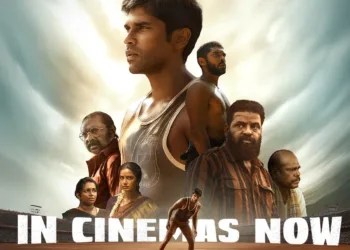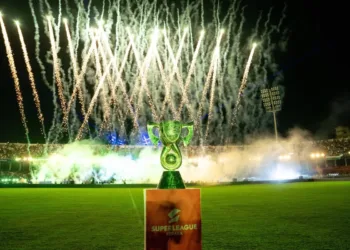The Pakistan Cricket Board (PCB) has suffered a significant diplomatic defeat as the International Cricket Council (ICC) officially rejected their formal demand to remove veteran match referee Andy Pycroft from the ongoing Asia Cup 2025. This decision came after the PCB accused Pycroft of orchestrating the controversial “no handshake” incident during Pakistan’s high-profile clash against India in Dubai on September 14.
Table of Contents
The Handshake Controversy That Triggered PCB’s Complaint
The drama unfolded during one of cricket’s most anticipated encounters when India defeated Pakistan by seven wickets at the Dubai International Cricket Stadium. The match was overshadowed by the absence of customary handshakes both before and after the game, leading to unprecedented tensions between the two cricket boards.

PCB Chairman Mohsin Naqvi, who also serves as President of the Asian Cricket Council (ACC), immediately filed a formal complaint with the ICC, alleging that match referee Andy Pycroft had violated the ICC Code of Conduct and MCC Laws pertaining to the Spirit of Cricket.
Key Allegations Against Andy Pycroft
| Allegation | PCB’s Claim | ICC’s Response |
|---|---|---|
| Pre-match Toss | Instructed captains not to shake hands | ACC officials informed Pycroft of policy |
| Team Sheet Exchange | Prevented normal protocol | Standard security measures |
| Post-match Conduct | Failed to ensure handshakes | Teams’ independent decision |
| Spirit of Cricket | Violated fundamental principles | No violations found |
The PCB specifically accused Pycroft of instructing Pakistan captain Salman Ali Agha not to shake hands with his Indian counterpart Suryakumar Yadav during the coin toss, breaking a long-standing cricket tradition that symbolizes sportsmanship and mutual respect.
ICC’s Firm Rejection and Official Stance
Late on Tuesday night, the ICC sent an official reply to the PCB categorically rejecting their demand for Pycroft’s removal. An ICC source confirmed to PTI: “Late last night, ICC had sent a reply to PCB stating that Pycroft won’t be removed and their plea has been rejected.”
The global cricket governing body clarified that it was Asian Cricket Council (ACC) officials on the ground who had informed Pycroft about the “no handshake” policy, not the referee’s independent decision. This revelation directly countered the PCB’s allegations that Pycroft had acted under Indian influence or violated cricket’s fundamental principles.
ICC’s Rationale for Rejection
The ICC’s decision was based on several key factors that demonstrate their commitment to protecting match officials and maintaining tournament integrity:
Procedural Clarity: The ICC established that Pycroft had merely followed instructions from ACC ground officials regarding the handshake protocol, making him a messenger rather than a decision-maker in the controversy.
Precedent Protection: ICC sources indicated that accepting the PCB’s demand would set a dangerous precedent, potentially allowing any nation to demand referee removals based on disagreements with officiating decisions.
Professional Standards: With 695 international games under his belt across men’s and women’s cricket, Andy Pycroft represents the ICC’s highest standards of match officiating, making his removal without cause professionally unjustifiable.
Andy Pycroft: A Distinguished Career Under Fire
The 69-year-old Zimbabwean veteran has become an unwitting central figure in this diplomatic crisis. Pycroft, a former international cricketer who played 3 Tests and 20 ODIs for Zimbabwe between 1983-1992, joined the ICC Elite Panel of Match Referees in March 2009.

Andy Pycroft’s Professional Profile
| Aspect | Details |
|---|---|
| International Career | 3 Tests, 20 ODIs (1983-1992) |
| Match Referee Since | March 2009 |
| Total Games Officiated | 695+ international matches |
| Panel Status | ICC Elite Panel Member |
| Current Age | 69 years |
His extensive experience includes officiating in some of cricket’s most high-pressure encounters, including previous India-Pakistan matches, World Cup fixtures, and bilateral series across all formats. The PCB’s attack on his integrity represents one of the most serious challenges to his distinguished officiating career.
Pycroft’s appointment to officiate Pakistan’s crucial group stage match against UAE on September 17 has added another layer of complexity to the controversy, with the PCB reportedly exploring alternative arrangements despite the ICC’s firm stance.
Pakistan’s Boycott Threat and Its Implications
The PCB had reportedly threatened to boycott their remaining Asia Cup fixtures if Pycroft remained as match referee, creating a potential crisis for tournament organizers. However, these threats appear to have been strategically deployed pressure tactics rather than genuine intentions.
Pakistan’s qualification scenario adds urgency to their position, as they must defeat UAE to advance to the Super 4 stage and potentially face India again. A boycott would result in automatic forfeiture, effectively ending Pakistan’s Asia Cup campaign and handing UAE qualification on a silver platter.
Tournament Implications of Potential Boycott
The ramifications of a Pakistan withdrawal would extend far beyond their individual campaign:
Commercial Impact: The India-Pakistan rivalry drives significant viewership and sponsorship revenue for Asian cricket. Pakistan’s absence would diminish the tournament’s commercial appeal and reduce broadcaster investment.
Diplomatic Consequences: A boycott over officiating disputes would strain relationships between PCB, ICC, and ACC, potentially affecting Pakistan’s participation in future tournaments.
Sporting Integrity: Forfeiting matches due to administrative disagreements would undermine cricket’s competitive integrity and set concerning precedents for future disputes.
Internal PCB Dynamics and Accountability
The controversy has exposed internal communication failures within the PCB structure, leading to significant personnel changes. PCB Chairman Mohsin Naqvi suspended Director of Cricket Operations Usman Wahla for failing to inform captain Salman Ali Agha about tournament protocols, particularly the “no handshake” policy.
Well-placed sources revealed that Wahla’s miscommunication left the Pakistan captain unprepared for the situation, contributing to the embarrassment and subsequent diplomatic fallout. This internal accountability measure demonstrates the PCB’s recognition of their own administrative shortcomings in the affair.
The Broader India-Pakistan Cricket Context
This incident reflects the complex geopolitical tensions that increasingly influence cricket relations between the two nations. India captain Suryakumar Yadav confirmed that the decision to avoid handshakes was coordinated with the Board of Control for Cricket in India (BCCI) and the Indian government, citing security concerns and recent terrorist activities.
The politicization of cricket encounters between India and Pakistan continues to challenge the sport’s traditional values of sportsmanship and mutual respect. Tournament organizers now face the ongoing challenge of balancing security concerns with cricket’s fundamental principles.
Historical Context of India-Pakistan Cricket Diplomacy
The handshake controversy represents the latest chapter in an increasingly complex relationship:
- 2019: Limited cricket engagement following Pulwama attack
- 2022: Resumption of bilateral cricket discussions
- 2023: Asia Cup hosting arrangements controversy
- 2024: Champions Trophy venue disputes
- 2025: Handshake protocol implementation
ICC’s Leadership Under Jay Shah
The ICC’s firm rejection of the PCB’s demand coincides with the leadership transition to Jay Shah, the former BCCI Secretary who recently assumed the ICC Chairmanship. Critics within Pakistan have suggested that Shah’s Indian background influenced the decision, though ICC sources maintain that established protocols and precedents guided their response.

The ICC’s handling of this controversy will be closely scrutinized as a test of their independence and ability to manage politically sensitive situations fairly across all member nations.
Match Referee Alternatives and Compromise Attempts
Despite the ICC’s categorical rejection, the PCB has proposed alternative arrangements for their remaining fixtures. Sources indicate they requested Richie Richardson, the other match referee in the tournament, to officiate their UAE encounter while Pycroft continues elsewhere.
This compromise attempt reflects the PCB’s desire to save face while avoiding the severe consequences of tournament withdrawal. However, the ICC’s response to these alternative proposals remains uncertain, with sources suggesting limited flexibility on established appointment protocols.
Future Implications for Cricket Governance
The PCB’s failed challenge to ICC authority carries broader implications for cricket governance and the balance of power between member boards and the global governing body. The precedent established by this rejection reinforces the ICC’s commitment to protecting match officials from political interference.
Lessons for Cricket Administration
Protocol Importance: The incident highlights the critical need for clear communication of tournament protocols to all participating teams and officials.
Political Neutrality: Match referees must be protected from political pressures that could compromise their professional judgment and independence.
Diplomatic Channels: Cricket disputes require proper diplomatic channels rather than public ultimatums that can escalate unnecessarily.
The Path Forward for Pakistan Cricket
With the ICC’s rejection confirmed and Pycroft continuing his duties, the PCB faces a crucial decision about their tournament participation. Their initial boycott threats appear to have been tactical positioning rather than serious intentions, given Pakistan’s desperate need for qualification.

The focus now shifts to Pakistan’s performance against UAE, where victory would secure Super 4 qualification and potentially set up another emotionally charged encounter with India. The PCB’s ability to refocus on cricket rather than administrative disputes will determine their tournament fate.
The incident serves as a reminder that cricket’s global governance structures remain robust enough to withstand political pressures while maintaining the integrity of international competitions.
Read More: BCCI Secures Record-Breaking ₹579 Crore Deal as Apollo Tyres Becomes Team India’s New Lead Sponsor
FAQs
What exactly did the PCB accuse Andy Pycroft of doing?
The PCB alleged that match referee Andy Pycroft instructed Pakistan captain Salman Ali Agha not to shake hands with Indian captain Suryakumar Yadav at the toss, violating the Spirit of Cricket and ICC Code of Conduct.
Why did the ICC reject the PCB’s demand to remove Pycroft?
The ICC clarified that it was Asian Cricket Council (ACC) officials who informed Pycroft about the “no handshake” policy, not his independent decision. The ICC also stated that removing him would set a dangerous precedent for future complaints.
Will Pakistan boycott their remaining Asia Cup matches?
Despite earlier threats, reports suggest Pakistan will not boycott the tournament. They need to defeat UAE to qualify for the Super 4 stage, making withdrawal strategically counterproductive.
Who is Andy Pycroft and what is his experience?
Andy Pycroft is a 69-year-old former Zimbabwean cricketer and veteran ICC match referee who has officiated in over 695 international matches since joining the Elite Panel in 2009.
What happens next with Pakistan’s Asia Cup campaign?
Pakistan must beat UAE on September 17 to advance to the Super 4 stage. Andy Pycroft will continue as match referee for this crucial encounter, despite the PCB’s objections.








